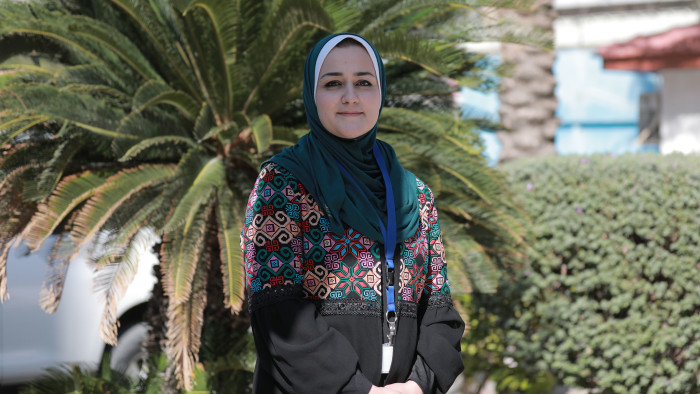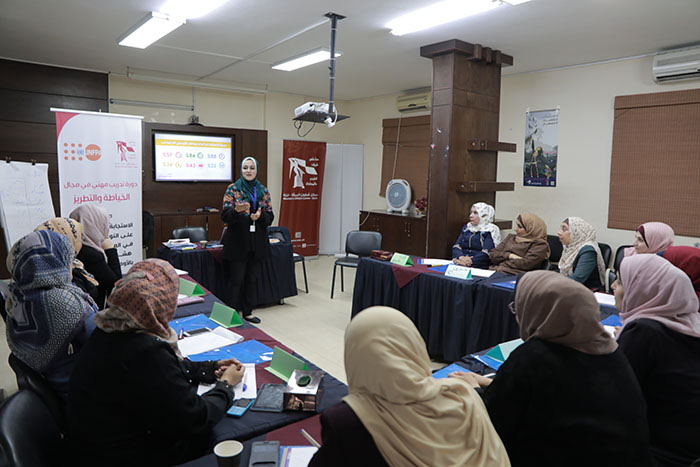An MBA student’s journey: From Gaza to Scotland and back

Roula Khalaf, Editor of the FT, selects her favourite stories in this weekly newsletter.
Winning a place at business school can be a struggle for any aspiring MBA student. But Amany S Abu AlQumboz, a Palestinian living in Gaza, had to overcome other hurdles before reaching that stage — such as finding a way out of her homeland, which does not have an airport.
Abu AlQumboz chose the full-time, one-year programme at the University of Edinburgh Business School, starting in 2017, because she thought the variety of elective courses would help prepare her for a future in humanitarian work — but also because of the quality of life that the Scottish capital promised.
“It is a very calm and beautiful city, and a place you could walk around easily. I used to walk every day, even climbing Arthur’s Seat,” she says, referring to the hill overlooking the city. “We miss these green spaces in Gaza.”
It also helped that the British Council, the cultural and educational organisation, had an office in Gaza, unlike the US, whose embassy was over the border in Israel.
Abu AlQumboz, who is married with a young daughter, counts herself as lucky among her fellow Palestinians. She grew up in relative privilege in the Palestinian territories, having the opportunity to study for an electrical engineering degree at the Islamic University of Gaza.
Even before she had graduated from the course in 2012, Abu AlQumboz was thinking about what to study next to improve her career prospects.
She was determined that her future lay in humanitarian work, and set her heart on a senior management role for a UN agency, where she could start in Gaza but might later have the chance to work in other countries. She soon realised that an MBA was her best chance of securing one of these much sought-after roles.
“I had applied for numerous positions but was never nominated,” she recalls, speaking from her home. “I joined the UN volunteer programme just to learn about the requirements for a full-time position at a high level.”
Abu AlQumboz almost missed the September start date of her MBA in Edinburgh because of delays in crossing Israel to reach an airport in Jordan. “Edinburgh’s admissions team were supportive,” she says, adding that she only received permission to cross Israel into Jordan on the day she was due to be in Edinburgh. “It was overwhelming, a miracle,” she says.
She found the learning experience very different. “The teaching style in Palestine for the bachelors degree is very traditional and old-style: it is all done by paper or presentations,” she says. “In contrast, the teaching style in Edinburgh is modern, open and diverse. We had a variety of external speakers, visits, networking events, group work, assignments and exams.”
The MBA was to prove crucial in achieving her dream: an end-of-course dissertation on gender-based violence was particularly important in securing a job. Having been turned down for every UN job she had applied to before moving to Edinburgh, Abu AlQumboz found that her MBA essay went to the heart of the work of a Canadian-funded project in Gaza helping those who had been caught up in gender-based violence, such as domestic abuse.
It was her first job application as an MBA graduate and she was accepted for the role of gender project associate with the UN Population Fund. The UN has two main buildings in the Gaza Strip and Abu AlQumboz now works with women and girls across Gaza and the West Bank, helping survivors of gender-based violence with legal, psychiatric, financial and medical support.

“Our role as project associates is to make field visits to follow up with the partners, prepare work plans, reports and best practices, and present success stories,” she says.
Working with the UN agencies in the Palestinian territories is a privilege, she adds, but one that comes with many complications. “The political conflict and division in Palestine affects our work,” she says, noting that government bureaucracy often causes disruption, with new policies and modifications to the legal terms of its operations. “We are working in a conservative community where we need to change lots of bigotry and beliefs.”
The MBA helped Abu AlQumboz finally achieve her ambition of humanitarian work, but beyond the struggle to reach Edinburgh there was a painful sacrifice — she had to leave her family behind. “I was happy and sad at the same time,” she says, “because I got the call in the morning saying I must leave now, meaning that I could not say a proper goodbye to my husband and daughter.”
She had known she would move temporarily to Edinburgh without her husband because he had recently taken a senior role in the mobile phone industry in Gaza and feared moving countries would damage his chances in a career he was passionate about. But then her daughter, aged two at the time, was refused a visa to travel to the UK because the scholarship Abu AlQumboz had received did not cover the cost of childcare in Edinburgh.
She says she was grateful for her scholarship from the Hani Qaddumi Scholarship Foundation, a Jordanian non-profit organisation which aims to help revitalise the Palestinian territories by providing international education opportunities for nationals. Life in Edinburgh was expensive, however, and sometimes Abu AlQumboz had to ask her husband for money transfers to cover living costs.
The delay in getting to Edinburgh also meant she spent the first few weeks working overtime to catch up. Even then, she had full days, in class from 9am to 5pm and then studying for up to four hours back in the room she rented in the city.
Looking back, she believes the experience was worth it. “I am extremely happy,” she says, adding that it is good to be back with her family in the country they love. “It feels that all the years of effort were finally worth it.”
Comments